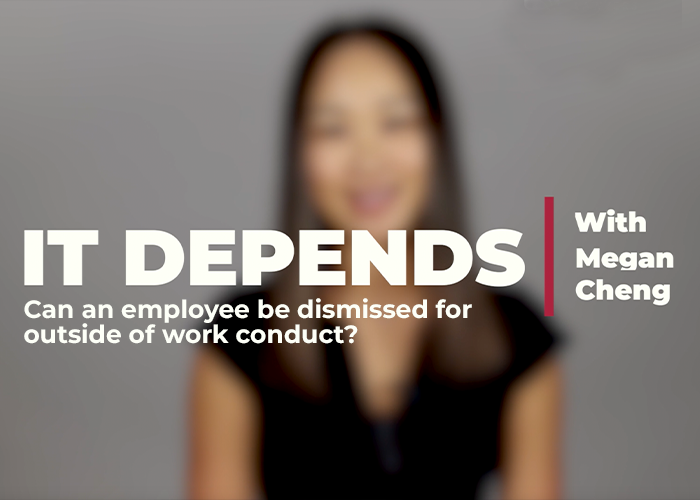Authored by: Justine Woods and Craig Turvey
Giving oral evidence at a court hearing for a family law dispute can make or break your case. Here are our top five tips to compellingly present your evidence while ...

In this edition of ‘It depends’, lawyer Megan Cheng talks about when an employee can be dismissed for conduct outside of work and how employers can prove that there is a relevant connection between the outside of work conduct and the employment relationship.
Hi and welcome to another edition of It Depends. Today, we’ll be talking about whether an employee can be dismissed for outside of work conduct.
Employers may find themselves in situations where they become aware of an employee’s conduct that would ordinarily constitute grounds for dismissal, however, the conduct took place outside of work or after hours. For example, at a party with colleagues or over social media. Before taking any action, it’s important that employers are aware of how to deal with these incidents appropriately to avoid the risk of an unfair dismissal claim.
It depends on whether there is a relevant connection between the outside of work conduct and the employment relationship. This can be established in three different circumstances. Firstly, when viewed objectively, the conduct is likely to cause serious damage to the relationship between the employee and the employer. Secondly, whether conduct damages the interests of the employer. Or lastly, where the conduct is incompatible with the employee’s duties as an employee.
It’s not enough for employers to simply say that the employee’s conduct could potentially affect the reputation of the business or show that the employee isn’t committed to their job. If an employee does bring an unfair dismissal claim, then employers will need to have sufficient evidence to prove how the connection was established.
There have been several cases where the Fair Work Commission has found that inappropriate conduct on social media can constitute a valid reason for dismissal. For example, in one case, an employee made inappropriate comments, on social media threatening, another employee. The Commission found that the employee’s colleagues could see the comments and threatening another employee is a serious issue, that won’t generally be tolerated in any workplace. Another common example is where employees are at work event, and then a group of employees go to another location afterwards. The Commission has found that it’s not necessary for the relevant conduct to have occurred at the same location as the work event in order for the conduct to be sufficiently connected to the employment relationship. When considering whether to dismiss an employee for outside of work conduct, employers should make sure that they understand the legal test and have enough evidence to prove how the relevant conduct is sufficiently connected to the employment relationship.
Employers should also take detailed records of all conversations and also the evidence that they use to support their decisions. If you need any advice or assistance with the process of dismissing an employee, feel free to contact a member of our team.
This publication is for information only and is not legal advice. You should obtain advice that is specific to your circumstances and not rely on this publication as legal advice. If there are any issues you would like us to advise you on arising from this publication, please let us know.
Subscribe to our interest lists to receive legal alerts, articles, event invitations and offers.



Cooper Grace Ward acknowledges and pays respect to the past, present and future Traditional Custodians and Elders of this nation and the continuation of cultural, spiritual and educational practices of Aboriginal and Torres Strait Islander peoples.
Fast, accurate and flexible entities including companies, self-managed superannuation funds and trusts.